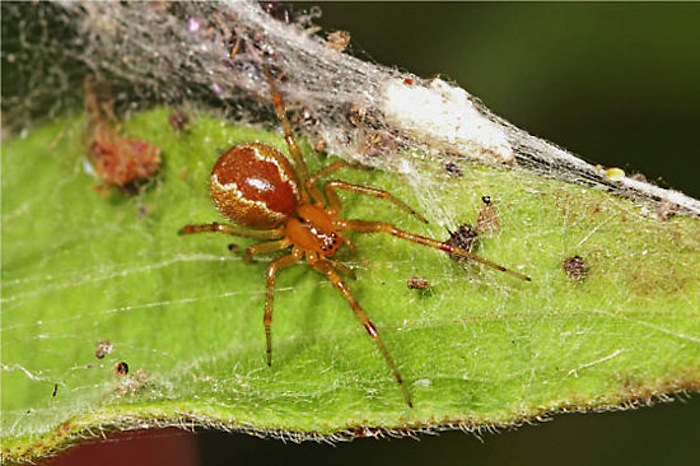Social Web: Female Spiders Adopt 'Warrior' or 'Nanny' Roles

Female spiders that live together in colonies may adopt "warrior" or "nanny" roles, similar to how insects can form "soldier" and "worker" castes, scientists say.
These new findings shed light on how differences in personality can help divide up labor in species, the researchers added.
Ants, bees, wasps, termites and other social insects form colonies that are often divided into specialized castes. These castes may include sterile workers and soldiers, as well as reproductive queens and males. [Creepy, Crawly & Incredible: Photos of Spiders]
Many other animals are social as well but do not form castes that areanatomically specialized for distinct tasks. However, some research groups recently suggested that differences in personalities may help to determine the division of labor in social animals.
To learn more, researchers investigated the comb-footed spider (Anelosimus studiosus), which can be found throughout the Americas, from New England to northern Argentina. These spiders form colonies, hunt together and share their webs and prey. They also communally guard egg sacs and feed immature spiderlings by regurgitating food.
The scientists noted that there are two kinds of female spiders in this species: aggressive females and docile females.
"Their personalities, unlike in many other species, are very clear-cut," said lead study author Colin Wright, a behavioral ecologist at the University of Pittsburgh.
Sign up for the Live Science daily newsletter now
Get the world’s most fascinating discoveries delivered straight to your inbox.
Past research has shown that aggressive females are more likely than docile females to attack prey and invaders. Still, "although docile females don't participate very much at all in prey capture, aggressive spiders share prey with docile individuals," Wright said."Everyone gets to eat."
It was unclear what role docile females actually play in these colonies, the researchers said. Some scientists had suggested docile females might "have an overall negative impact on colony success," Wright said."Other studies, however, showed that mixed colonies performed better than colonies composed of either 100 percent docile or 100 percent aggressive colonies, showing that docile individuals must be doing something important in these colonies," he added.
To discover what role docile females play, the scientists examined how well 141 aggressive and 148 docile female spiders performed individually at various tasks. Additionally, in experiments with a different group of this spider species, the researchers created 60 laboratory colonies, each made up of two aggressive and two docile female spiders, and investigated how those females divided up labor.
Individually, aggressive females were more than twice as effective as docile females at capturing cricket prey, and they also constructed webs that retained cricket prey about two-thirds longer than webs constructed by docile females. Furthermore, in colonies, aggressive females repaired webs, attacked potential prey and defended against invasive funnel weaver spiders (Barronopsis texana) nearly three times more often than docile females.
But individually, offspring raised by docile females were twice as likely to survive as young spiders raised by aggressive females. In colonies, docile females took care of the young three times more often than aggressive females, by guarding egg cases, residing within clusters of progeny or regurgitating to feed offspring.
"We were surprised at how good of parents docile spiders turned out to be," Wright said. "They're much better parents than aggressive spiders."
In contrast, males "frankly don't do much other than mate with females," Wright said. "They do not display the same personality differences as do females, and they do not perform essential colony functions — such as web repair, colony defense, prey capture or brood care — like females do. That is why this study, and just about every study with this species, focuses on the females."
These findings reveal how much "personalities can structure division of labor," Wright said. "We hope other researchers will pay close attention to personality differences in their systems, because animal personalities are seemingly ubiquitous across the animal kingdom," he added.
Future research can investigate what causes personality differences in these species. "We do know that the personalities are largely heritable, suggesting a genetic component, but we cannot rule out other factors, such as early life learning," Wright said.
Wright and his colleagues Tate Holbrook and Jonathan Pruitt detailed their findings online today (June 16) in the journal Proceedings of the National Academy of Sciences.
Follow us @livescience, Facebook & Google+. Original article on Live Science.










